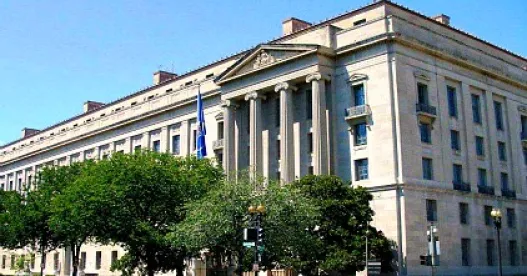On May 9, 2018, Deputy Attorney General Rod Rosenstein announced a new Department of Justice (DOJ) policy “that encourages coordination among [DOJ] components and other enforcement agencies when imposing multiple penalties for the same conduct.” The goal of the new policy, which is memorialized in the United States Attorney’s Manual (USAM § 1-12.100 (2018)) and is similar to a previously announced policy governing enforcement in Foreign Corrupt Practices Act cases, is “to enhance relationships with [DOJ’s] law enforcement partners in the United States and abroad, while avoiding unfair duplicative penalties.” The new policy is an encouraging development that may prevent future unfair outcomes resulting from a lack of coordination among DOJ and other enforcement authorities, including, among others, the Securities & Exchange Commission, the Commodities Futures Trading Commission, and various state, local and international authorities.
The new policy requires DOJ attorneys to “coordinate with one another to avoid the unnecessary imposition of duplicative fines, penalties and/or forfeiture against [a] company,” and also instructs DOJ attorneys to “endeavor, as appropriate, to . . . consider the amount of fines, penalties and/or forfeiture paid to federal, state, local or foreign law enforcement authorities that are seeking to resolve a case with a company for the same misconduct.”
Rosenstein stated that the new policy “discourages ‘piling on’ by instructing [DOJ] components to appropriately coordinate with one another and with other enforcement agencies[.]” Rosenstein explained that “‘[p]iling on’ can deprive a company of the benefits of certainty and finality ordinarily available through a full and final settlement.” Rosenstein further stated that the new policy was implemented to “encourage companies to report suspected wrongdoing to law enforcement and to resolve liability expeditiously” by limiting the imposition of penalties by multiple authorities for the same conduct.
There are four key features of the new policy:
- First, the new policy reaffirms that “the federal government’s criminal authority should not be used against a company for purposes unrelated to the investigation and prosecution of a possible crime.” In other words, DOJ attorneys should not employ the threat of criminal prosecution solely to persuade a company to enter into a larger settlement in a civil case.
- Second, the new policy directs DOJ components to “coordinate with one another, and achieve an overall equitable result.” This coordination “may include crediting and apportionment of financial penalties, fines, and forfeitures, and other means of avoiding disproportionate punishment.”
- Third, the new policy encourages DOJ attorneys, “when possible, to coordinate with other federal, state, local, and foreign enforcement authorities seeking to resolve a case with a company for the same misconduct.”
- Finally, the new policy sets forth factors for DOJ attorneys to consider when evaluating whether multiple penalties may be warranted in a particular case. These factors include “the egregiousness of the wrongdoing; statutory mandates regarding penalties; the risk of delay in finalizing a resolution; and the adequacy and timeliness of a company’s disclosures and cooperation with [DOJ].”
Rosenstein noted, however, that “[c]ooperating with a different agency or a foreign government is not a substitute for cooperating with [DOJ],” and that DOJ “will not look kindly on companies that come to [DOJ] only after making inadequate disclosures to secure lenient penalties with other agencies or foreign governments.” In those cases, DOJ “will act without hesitation to fully vindicate the interests of the United States.”
In addition to the new policy, Rosenstein separately announced the creation of a new DOJ Working Group on Corporate Enforcement and Accountability. The new Working Group “includes [DOJ] leaders and senior officials from the FBI, the Criminal Division, the Civil Division, other litigating divisions involved in significant corporate investigations, and the U.S. Attorney’s Offices.” The Working Group “will make internal recommendations about white collar crime, corporate compliance, and related issues.”
The new policy is undoubtedly an encouraging development for companies that find themselves in the cross-hairs of DOJ and other enforcement agencies. However, the practical effect of the policy depends on how it is applied going forward. As noted above, the policy requires coordination, but it does not specify how such coordination will be implemented or accomplished. In addition, the policy allows DOJ attorneys to consider subjective factors when determining the appropriate outcome in a given case. That said, the new policy should be helpful in future situations where companies are negotiating a settlement with DOJ. In particular, the new policy provides concrete support for the argument that fines and penalties in related proceedings should be considered by DOJ in determining a just and reasonable outcome. If implemented in accordance with the Deputy Attorney General’s statements, the new policy should lead to more reasonable dispositions for companies, which, in turn, could be an incentive for more companies to self-report potential violations.




 />i
/>i

